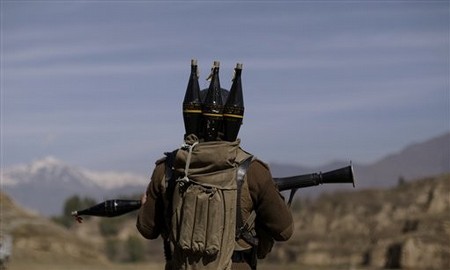Insurgent attacks by the Taliban are on the rise despite the surge.

The Obama administration contends that the Afghanistan surge has blunted the Taliban's momentum. Spencer Ackerman notes that Taliban attacks have actually increased:
According to military statistics acquired by Danger Room, attacks initiated by insurgents from May 1 to June 30 rose 2 percent from that same period in 2010. Thatâ??s the dawn of the so-called â??spring fighting season,â? when the Taliban typically fight the hardest. And it seemingly contradicts Petraeusâ?? assertion to the New York Times this morning that â??insurgent attack numbers are lowerâ? for the first time since 2006....Can the insurgencyâ??s momentum be reversed with fewer U.S. troops? Heading to Afghanistan on Saturday, Defense Secretary Leon Panetta urged the military to keep â??maximum pressure on the Talibanâ? in order to convince insurgents to sue for peace. The reigning theory is that the Taliban wonâ??t talk seriously until they take a beating. Peace talks are the only political strategy on hand to end the war, but the numbers hardly give a reason to believe the Taliban should feel cowed.
And if al-Qaida is all but iced, as Panetta argues, then it may not be so important that the Talibanâ??s momentum has merely stalled, since the U.S. only cares about the Taliban insofar as it aids al-Qaida. But would Obama have endorsed the surge if he knew that the most it would accomplish after 18 months is a two percent increase in insurgent attacks?
Even if the Taliban is considerably weaker now than it was 18 months ago, it doesn't bode well for the long-term security of Afghanistan that they can mount more operations despite the full court press from the U.S. and its coalition partners. The Obama administration needs something akin to the Anbar Awakening among the Pashtuns to really drive down violence - and that doesn't seem to be happening. Quite the contrary, as M K Bhadrakumar writes, the "serpent of Pashtun nationalism" has reared its head and is attacking both Afghanistan and Pakistan. Still, a regional solution might be possible. As Bhadrakumar suggests, India and Pakistan are moving slowly toward reconcilable positions on the future of Afghanistan. Faster, please.
(AP Photo)











